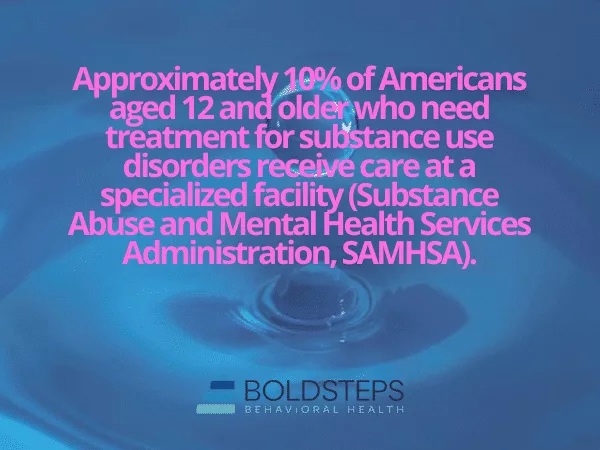The first 30 days of drug rehab are often the most critical in setting the foundation for a successful recovery journey. During this time, individuals transition from active substance use to embracing a structured environment focused on healing and growth. It can be a challenging yet transformative period filled with detox, therapy, and skill-building.
Are you ready to start 30 days of drug rehab? If so, understanding what to expect during this critical time will help alleviate your concerns and prepare you for the path ahead. At Bold Steps Behavioral Health, we are here to help you every step of the journey.
The Initial Assessment: Understanding Your Needs
Your initial step in rehabilitation will be a thorough evaluation by a team of professionals. This evaluation contains:
- A medical examination to determine any health issues.
- Psychological examinations can help you understand your emotional state and triggers.
- A personal interview to discuss your substance-use history.Week 1: Detox and Stabilization
The first week typically focuses on detoxification, a process where the body clears itself of harmful substances. This step is critical for addressing physical dependency and stabilizing individuals for the therapeutic work ahead.
What Happens During Detox?
- Comprehensive Assessment: Upon arrival, medical and psychological evaluations are conducted to determine the severity of addiction, co-occurring disorders, and specific treatment needs.
- Withdrawal Management: At our Drug Detox Center, withdrawal symptoms are closely monitored, and medications may be administered to alleviate discomfort, especially for substances like benzodiazepines or opioids.
- Supportive Care: Counselors provide emotional support and encouragement to help individuals navigate this challenging phase.
Typical Withdrawal Symptoms
- Physical: Sweating, nausea, tremors, fatigue.
- Psychological: Anxiety, irritability, mood swings, cravings.
- Duration: Most symptoms peak within 3-7 days, but this varies based on the substance used.
Week 2: Building a Routine and Starting Therapy
After detox, individuals transition to a more structured treatment phase. This is when therapy begins, and participants start developing a routine that promotes stability and focus.
Establishing Structure
- Daily Schedules: Rehab programs provide a structured schedule, including therapy sessions, group meetings, and wellness activities.
- Healthy Habits: Meals, sleep schedules, and exercise are emphasized to promote physical and mental well-being.
Beginning Therapy
- Individual Therapy: Therapists work one-on-one with individuals to explore the root causes of addiction and develop personalized coping strategies.
- Group Therapy: Sharing experiences with peers fosters a sense of community and reduces feelings of isolation.
- Family Therapy: For those participating in family-inclusive programs, this is an opportunity to rebuild trust and improve communication with loved ones.
Week 3: Intensive Skill-Building and Self-Discovery
By the third week, individuals begin diving deeper into therapeutic work and skill-building activities. The focus shifts to addressing emotional triggers, developing resilience, and learning practical tools for long-term recovery.
Therapeutic Focus
- Cognitive Behavioral Therapy (CBT): Helps individuals identify and change negative thought patterns that lead to substance use.
- Dialectical Behavior Therapy (DBT): Teaches emotional regulation and stress management techniques.
- Trauma-Informed Therapy: Addresses past trauma that may contribute to addictive behaviors.
Developing Life Skills
- Relapse Prevention Planning: Identifying triggers and high-risk situations while creating actionable plans to manage them.
- Stress Management: Techniques like mindfulness, meditation, and deep breathing exercises.
- Communication Skills: Learning how to express emotions and resolve conflicts constructively.
Week 4: Preparing for the Future
As individuals approach the end of their first month in rehab, the focus shifts to creating a plan for continued care and long-term recovery.
Transition Planning
- Step-Down Programs: Depending on progress, individuals may transition to a Partial Hospitalization Program (PHP), Intensive Outpatient Program (IOP), or Outpatient Treatment Program to maintain support while gaining independence.
- Relapse Prevention: Therapists work with individuals to refine their relapse prevention plans and build confidence in their ability to handle real-world challenges.
- Aftercare Support: Individuals are connected with ongoing resources, such as support groups, alumni programs, or outpatient therapy.
Reflecting on Progress
- Many individuals begin to notice significant improvements in their mental clarity, emotional regulation, and physical health.
- Reflection activities, like journaling or goal-setting, help solidify the lessons learned during the first 30 days.
The purpose of this examination is to develop a treatment plan that is personalized to your specific needs. Bold Steps prioritizes personalized treatment to ensure your recovery success.
Medical Detox: The First Milestone
For many clients, the first 30 days begin with a supervised detox. This procedure entails carefully eliminating chemicals from your body under physician supervision. You may feel withdrawal symptoms such as anxiety, nausea, or mood swings, but don’t worry; you’re not alone.
At Bold Steps, we offer 24-hour support to help you manage your discomfort and be safe while detoxing. It is a critical stage for establishing a foundation of sobriety.
Adjusting to the Rehabilitation Environment
Entering a rehabilitation program frequently requires adjusting to a regulated setting. Therapy sessions, group activities, and personal leisure may all be part of one’s daily agenda. While the regimen may initially appear stiff, it provides a sense of consistency, which is essential for recovery.
You’ll also meet people who have experienced similar difficulties. Building these connections promotes a sense of community and reminds you that you are not alone on this path.
Individual and group therapy sessions
For healing, therapy plays a crucial role in During the first month, you will attend both individual and group sessions.
- Individual Therapy: One-on-one sessions with a competent therapist can help you identify the underlying causes of addiction and build coping techniques.
- Group therapy: Sharing experiences with peers can provide significant insights and emotional support.
At Bold Steps, we use evidence-based therapies including Cognitive Behavioral Therapy (CBT) to provide clients with tools for long-term success.
Developing Healthy Habits
Rehab is more than just quitting drugs; it is about living a healthier lifestyle. During the first 30 days, you will participate in activities that enhance overall well-being, such as:
- Regular activity and balanced meals.
- Mindfulness practices include yoga and meditation.
- Journaling facilitates emotional processing and progress monitoring.
These new habits replace old detrimental routines, laying the framework for a healthier lifestyle.
Support from a Dedicated Team
One of the most reassuring parts of rehabilitation is the constant support of knowledgeable specialists. The staff at Bold Steps Behavioral Health is dedicated to assisting you on your life-changing journey. Whether you need advice, encouragement, or simply someone to talk to, our team is always available to you.
Challenges and How to Overcome Them
The first 30 days of rehab can be challenging as individuals adjust to a new lifestyle and face the emotional impact of recovery. Here’s how to navigate common challenges:
Challenge: Cravings and Triggers
- Solution: Learn and practice coping strategies through therapy and relapse prevention sessions.
Challenge: Emotional Overload
- Solution: Engage in mindfulness practices, and don’t hesitate to lean on counselors and peers for support.
Challenge: Doubts About Recovery
- Solution: Celebrate small victories, focus on progress rather than perfection, and trust the process.
The Role of Family and Support Systems
Family and loved ones play a vital role in the recovery journey. Programs like our Benzo Addiction Treatment Program often include family therapy to help loved ones:
- Understand addiction as a chronic disease.
- Improve communication and rebuild trust.
- Learn how to provide constructive support without enabling behaviors.
Why Choose Bold Steps Behavioral Health for Your Recovery
At Bold Steps Behavioral Health, we believe that recovery is not just about abstaining from substances but about rebuilding a fulfilling, meaningful life. Our comprehensive services are designed to address every aspect of addiction, from detox to therapy and aftercare.
What We Offer:
- Drug Detox Center: Safe and medically supervised detoxification.
- Drug Addiction Treatment Center: Holistic, evidence-based care tailored to individual needs.
- Partial Hospitalization Program (PHP): Intensive therapy and structured daily schedules.
- Intensive Outpatient Program (IOP): Flexible treatment for those balancing recovery with daily responsibilities.
- Outpatient Treatment Program: Long-term support and relapse prevention strategies.
- Benzo Addiction Treatment Program: Specialized care for benzodiazepine dependency.
Choose Bold Steps For Your Addiction Treatment Programs
At Bold Steps Behavioral Health, we understand that each recovery path is unique. Our programs are designed to meet you where you are and offer comprehensive care that is tailored to your specific requirements. Bold Steps is where healing begins, with tailored treatment plans and a welcoming community. So, what are you waiting for? Contact us to assist you in embracing an addiction-free lifestyle.
Conclusion
The first 30 days of drug rehab are a transformative time filled with challenges, growth, and the foundation for a brighter future. By addressing the physical, emotional, and psychological aspects of addiction, individuals can take meaningful steps toward recovery.
If you or a loved one is ready to begin the journey to recovery, Bold Steps Behavioral Health is here to guide you. Contact us today at (717) 702-6335 to learn more about our programs and take the first bold step toward lasting sobriety.
FAQ About 30 Days in Drug Rehab
What happens during the first 30 days of drug rehab?
The first 30 days typically involve detoxification, therapy, skill-building, and creating a foundation for long-term recovery. Programs focus on stabilizing physical health, addressing emotional triggers, and developing coping strategies.
How does detox fit into the first 30 days?
Detox is usually the initial step in rehab, where substances are safely removed from the body under medical supervision. This prepares individuals for the therapeutic work that follows.
What types of therapy are included in the first 30 days?
Therapies include individual counseling, group therapy, family therapy, and evidence-based approaches like Cognitive Behavioral Therapy (CBT) and Dialectical Behavior Therapy (DBT).
How does family therapy contribute to recovery in the first 30 days?
Family therapy helps rebuild trust, improve communication, and create a supportive environment for recovery. It’s especially beneficial in programs like the Benzo Addiction Treatment Program.
What happens after the first 30 days of rehab?
After the first month, individuals often transition to step-down programs like Partial Hospitalization Program (PHP), Intensive Outpatient Program (IOP), or Outpatient Treatment Program, depending on their progress and needs.





